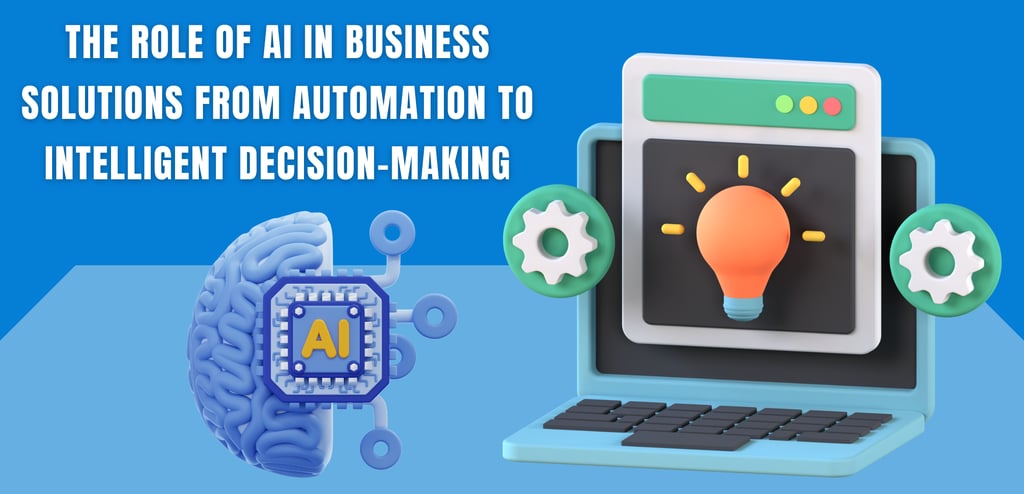
The Role of AI in Business Solutions From Automation to Intelligent Decision-Making
By AZ Konnect Team
11/13/20245 min read


In recent years, artificial intelligence (AI) has evolved from a futuristic concept into a transformative force driving change across industries. Today, businesses of all sizes are leveraging AI to improve efficiency, enhance customer experiences, and make smarter, data-driven decisions. From automating routine tasks to powering intelligent decision-making, AI is revolutionizing how companies operate in the modern marketplace.
In this blog post, we’ll explore the critical role AI plays in business solutions, how it’s reshaping industries, and the ways in which businesses can harness its potential to stay competitive.
1. AI in Business: A New Era of Automation
One of the most significant contributions of AI to business operations is automation. AI-powered systems can streamline repetitive tasks, allowing businesses to reduce manual labor, minimize human error, and save valuable time. By automating routine processes, companies can allocate resources to more strategic, high-impact activities that drive growth.
Automating Mundane Tasks
Many businesses rely on AI for automating day-to-day tasks such as data entry, invoice processing, customer support, and inventory management. In industries like e-commerce, AI-driven chatbots provide round-the-clock customer service, handling inquiries, resolving issues, and offering personalized product recommendations without human intervention. This not only reduces the workload for employees but also enhances the customer experience by providing immediate responses.
Similarly, in finance, AI can automate processes like fraud detection, expense reporting, and compliance monitoring. AI algorithms quickly analyze vast amounts of financial data, flagging irregularities and ensuring regulatory adherence with unparalleled speed and accuracy.
Improving Workflow Efficiency
AI’s ability to optimize workflows extends to nearly every industry. In manufacturing, AI-driven robots work alongside human teams to assemble products, monitor machinery, and identify maintenance needs in real time. In healthcare, AI assists with medical data analysis, helping doctors diagnose illnesses faster and with greater precision.
By automating these processes, businesses are seeing dramatic improvements in efficiency and cost savings, all while reducing human error and increasing productivity.
2. AI and Intelligent Decision-Making: Beyond Automation
While AI’s role in automation is transformative, its ability to support intelligent decision-making represents an even more profound shift. AI systems can process and analyze massive amounts of data at speeds that humans simply cannot match, providing businesses with actionable insights that drive better decision-making.
Data-Driven Insights
Data has become a valuable asset for modern businesses, but the sheer volume of data generated daily can be overwhelming. AI helps solve this problem by analyzing data at scale, extracting meaningful patterns, and providing insights that guide decision-making.
For example, AI-powered analytics tools can help marketing teams identify customer trends, preferences, and behavior patterns. By analyzing data from social media, website visits, and sales records, AI can help businesses segment their audience, personalize campaigns, and predict future buying trends. This enables more targeted marketing efforts that deliver better results.
In retail, AI can analyze purchasing patterns and inventory levels to forecast demand, allowing businesses to optimize their supply chains, reduce waste, and avoid stockouts or overstocking. AI-driven forecasting models provide businesses with the insights they need to make proactive, informed decisions that impact their bottom line.
Enhancing Strategic Planning
AI is also helping businesses make more informed strategic decisions. By integrating AI into decision-making processes, companies can evaluate a wider range of scenarios and predict potential outcomes with greater accuracy. In industries like finance, AI models can assess risks, analyze market trends, and recommend investment strategies that align with a company’s objectives and risk tolerance.
For example, AI in financial services helps companies perform stress testing to evaluate how various economic factors, such as interest rate changes or market volatility, may affect their portfolios. This allows for more robust risk management and strategic planning, giving businesses the foresight to navigate future challenges.
In human resources, AI tools assist with talent acquisition by analyzing resumes, identifying top candidates, and predicting employee retention based on historical hiring data. This enhances recruitment efforts by helping HR teams make smarter, data-driven decisions about who to hire and when.
3. AI-Powered Customer Experiences
One of the most compelling applications of AI in business is its ability to enhance the customer experience. From personalized recommendations to conversational AI, businesses are increasingly using AI to create more seamless, engaging, and relevant interactions with their customers.
Personalization at Scale
Personalization is key to improving customer satisfaction and loyalty, and AI enables businesses to deliver personalized experiences at scale. By analyzing customer data, AI systems can tailor product recommendations, content, and marketing messages based on individual preferences and behavior.
E-commerce platforms like Amazon and Netflix have been pioneers in using AI for personalization. Their recommendation algorithms analyze past purchases, viewing history, and browsing habits to suggest products or content that are likely to resonate with each customer. This level of personalization leads to higher engagement, increased conversions, and greater customer loyalty.
In retail, AI-powered virtual assistants can offer personalized shopping experiences by guiding customers through product catalogs based on their preferences, size, or style. These AI-driven interactions create a customized journey that enhances the overall shopping experience.
Conversational AI and Chatbots
Another impactful use of AI in customer service is the implementation of conversational AI and chatbots. These systems simulate human conversation and can handle customer inquiries, complaints, and support requests in real time. AI chatbots are particularly valuable for businesses that need to manage high volumes of customer interactions without overburdening their human workforce.
AI chatbots not only reduce response times but also provide personalized responses based on previous interactions and customer data. For instance, AI-powered customer service bots can analyze a customer’s past purchases and browsing history to recommend solutions or upsell complementary products. This level of real-time, personalized interaction improves customer satisfaction while freeing up human agents to handle more complex issues.
4. Ethical Considerations and Challenges of AI
While AI offers numerous benefits for business solutions, it also presents ethical challenges that businesses must address. AI algorithms, for example, can unintentionally perpetuate biases in decision-making if they are trained on biased data sets. This can lead to unfair hiring practices, biased customer service interactions, or discriminatory lending decisions in finance.
To mitigate these risks, businesses must prioritize transparency and accountability when implementing AI solutions. This includes regular audits of AI models, using diverse and representative data sets, and ensuring that human oversight is part of the decision-making process.
Furthermore, AI adoption raises concerns about job displacement. While AI can streamline operations and improve efficiency, businesses must strike a balance between automation and preserving opportunities for human workers. By upskilling employees and creating new roles that complement AI technologies, businesses can ensure that the integration of AI leads to growth rather than workforce reduction.
5. The Future of AI in Business Solutions
AI is rapidly becoming a cornerstone of business innovation. As AI technologies continue to evolve, their role in shaping industries will expand even further. In the future, AI-powered tools will likely become more sophisticated, offering even greater predictive capabilities, improved personalization, and more efficient automation processes.
For businesses, this presents a significant opportunity to stay ahead of the curve by adopting AI-powered solutions early and integrating them into their long-term strategies. Companies that invest in AI now will be better positioned to navigate future challenges, optimize operations, and create a competitive edge in their respective industries.
Conclusion
AI is no longer a buzzword—it’s a business necessity. From automating routine tasks to driving intelligent decision-making, AI is transforming how companies operate, innovate, and grow. By leveraging AI-powered tools, businesses can enhance productivity, deliver personalized customer experiences, and make data-driven decisions that drive success.
However, businesses must also be mindful of the ethical considerations that come with AI adoption. Ensuring fairness, transparency, and accountability will be key to building trust and maximizing the benefits of AI for the long term.
As AI continues to shape the future of business solutions, companies that embrace this technology will be well-positioned to thrive in the digital age. Whether through automation, personalization, or intelligent insights, AI offers endless possibilities for businesses willing to explore its potential.
Subscribe To Our Newsletter


